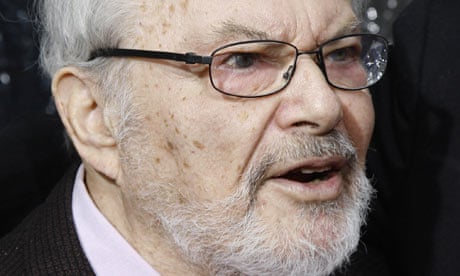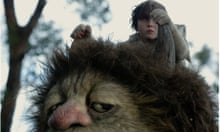Parents who think the new film of Maurice Sendak's picture book Where the Wild Things Are is too frightening for children can "go to hell", the author has said.
Telling the story of a naughty little boy, Max, who is sent to bed without his supper only to journey by boat to a land where wild monsters live, Sendak's classic tale was first published in 1963 and has captured children's imaginations ever since. With a film version adapted by Dave Eggers and Spike Jonze out later this year, Sendak told this week's edition of Newsweek that he would "not tolerate" parental concerns about the book being too scary.
"I would tell them to go to hell," Sendak said. And if children can't handle the story, they should "go home," he added. "Or wet your pants. Do whatever you like. But it's not a question that can be answered."
Sendak also criticised Disney, saying it was "terrible" for children. As a child himself, he'd loved Mickey Mouse as "the emblem of happiness and funniness", and at the cinema he would stand on the chair screaming "My hero! My hero!" at the mouse – who at that point still had teeth. "He was more dangerous," the author told Newsweek. "He did things to Minnie that were not nice. I think what happened was that he became so popular – this is my own theory – they gave his cruelty and his toughness to Donald Duck. And they made Mickey a fat nothing. He's too important for products. They want him to be placid and nice and adorable. He turned into a schmaltzer. I despised him after a point."
He based the monsters of Where the Wild Things Are on relatives who visited his family home as a child, speaking practically no English. "They grabbed you and twisted your face, and they thought that was an affectionate thing to do," he said. "And I knew that my mother's cooking was pretty terrible, and it also took forever, and there was every possibility that they would eat me, or my sister or my brother. We really had a wicked fantasy that they were capable of that. We couldn't taste any worse than what she was preparing. So that's who the Wild Things are. They're foreigners, lost in America, without a language. And children who are petrified of them, and don't understand that these gestures, these twistings of flesh, are meant to be affectionate."
Sendak also recalled a fight he had with his publisher about Where the Wild Things Are, with the safety-conscious publisher keen to change the word "hot" to "warm" at the end of the book, when Max returns from his reign as king over the monsters to find his dinner "was still hot". "It was going to burn the kid. I couldn't believe it. But it turned into a real world war, just that word," Sendak told the magazine.
He won out eventually by "just going at it", he said. "Just trying to convey how dopey 'warm' sounded. Unemotional. Undramatic. Everything about that book is 'hot'."




Comments (…)
Sign in or create your Guardian account to join the discussion